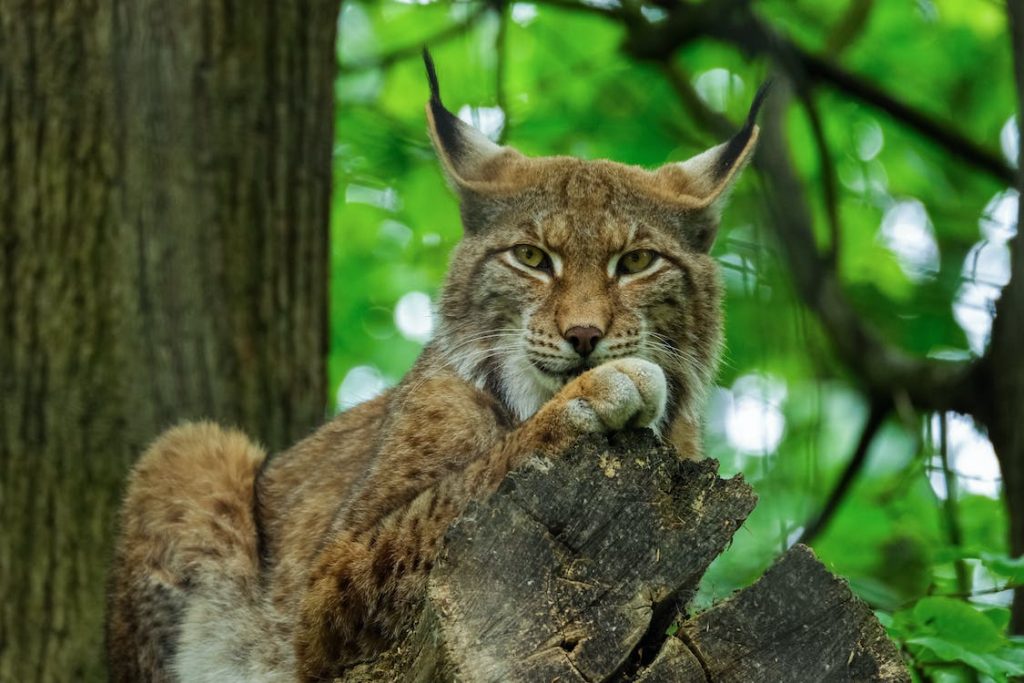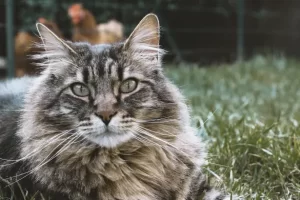
If you’re considering adding a lynx to your family, there are a few things you need to know first. While these wild cats can make for adorable and unique pets, they certainly aren’t for everyone. Keep reading to learn more about whether or not a lynx would be a good fit for your home. A pet lynx is unusual to keep in your home, but it can make for a fascinating and unique pet. They are native to North America and Europe and prefer forests, meadows, and wetlands as their habitat. Lynx has a thick coat of fur that varies from light to dark brown with black markings. They also have long tufts of fur on their ears and short, black-tipped tails. Given that Lynx is wild animals, they require special care to thrive as a pet.
The Appearance Of Lynx Cat
For those interested in owning a lynx, it’s important to be aware of the animal’s physical characteristics. Lynx cats are medium-sized wild cats with long legs and short tails. They have tan fur with black spots and stripes on their faces and bodies. Their ears are tufted, which helps them hear better.
According to (Dolores Stantoff, Veterinary Technician, Eagle River AK), their body colors vary from goldish to medium brow, and they have long hair on their tails, which makes them ideal for cold climates. They have large eyes and a long neck that allows them to see over tall grasses. The ears are also tufted with fur, which helps them detect the movements of small prey. All species of Lynx have white fur on their chests, bellies, and chin which helps them blend in with the snow. They have large feet, allowing them to move through deep snow with ease.
Lynx Cet Behavior
Lynx cats have an instinct to hunt and roam, making them challenging to keep as pets. Pet lynxes need plenty of space to explore and exercise and lots of stimuli like toys and other cats. They can also be quite vocal – often communicate through a series of meows, chirps, and growls. Additionally, lynx cats are very territorial creatures, so they may not react well to unfamiliar people or animals in their space.
An adult Lynx has predatory instincts that make it hard to train them, but with patience and proper training, a domesticated Lynx can learn simple commands. They are also very sensitive creatures, so it is important to never use punishment or negative reinforcement when interacting with your pet lynx. They can be unpredictable and unpredictable behavior can be dangerous for you and your pet. As such, you must always provide a safe environment for them. For instance, they can decide to attack without warning and may cause serious injuries to anyone in the vicinity.
If you find a baby lynx, so to speak, it will have similar behaviors to that of a kitten. Lynx kittens are curious and playful creatures that need lots of space to roam. You will soon find that there are better ideas than keeping it as an in-house cat since there is a considerable difference between wild and domesticated cats. Additionally, the animal will be considered tame if used to being around people. That said, a domesticated lynx means the animal can live freely with people and roam around its surroundings without feeling afraid or threatened. It takes many generations for animals to be considered genuinely domesticated, and the Lynx does not meet the threshold. Therefore, a domesticated lynx, inbred with a typical cat, should be the ideal choice of pet.
Why Might You Want A Lynx As A Pet?
With their unique spotted coats, striking tufted ears, and spectacularly long whiskers, it’s no surprise that Lynx are becoming increasingly popular pets. They can be loyal and affectionate towards their owners and make fantastic companions. Although Lynx must remain wild animals with strict laws governing their ownership, if you have the necessary permits, they can make additional outstanding family members. Many experts advise researching local regulations before taking on a lynx as a pet to ensure everyone is legally compliant. According to VCA Hospitals, owning a lynx also demands considerable space and regular interaction to provide essential mental stimulation. With so many advantages and considerations, owning a lynx can be a gratifying experience for you and the animal.
Whether Or Not You Can Have A Lynx As Your Pet?
Many people are captivated by the beauty of the Lynx and have considered keeping one as a pet. However, the truth is that it is not feasible to do so in most parts of the world. While they may be owned legally in certain areas, this typically requires a permit, as well as special accommodations, since they require far more space than regular house cats and need a partner/companion of their own species to thrive. Although one could technically keep them at home, it would likely be highly stressful for both parties. Instead, lynx conservation efforts are better supported through dedicated sanctuaries and providing wild populations with proper food sources, avoiding any disruption to their habitats or forced interactions with humans.
Is It Legal To Keep A Lynx As A Pet?
In the USA, different states have different laws on the domestication of wild animals. You need to find out the laws in your state and make sure that you are compliant. It is also important to remember that owning a pet lynx means taking on a big responsibility – they require special care, space, attention, and commitment to ensure their well-being. In some states, it may be possible to obtain a permit or license, which will allow you to keep the animal as a pet. However, if you can’t obtain this, then it is likely illegal to keep a lynx as a pet in your state. There are also many other countries where keeping a wild animal, such as a lynx, as a pet may be illegal.
- There are four states that have no laws when it comes to keeping dangerous wild animals like wild cats. They include Wisconsin, North Carolina, Nevada, and Alabama.
- There are six states that do not regulate or ban people from keeping cats as pets. They include Oklahoma, Delaware, Wisconsin, North Carolina, Nevada, and Alabama. These states do not have any specific laws regarding keeping wild cats as pets.
- There are twenty-one states that have laws prohibiting or restricting people from owning wild cats as pets, while the others only allow certain species under strict regulations.
- A total of thirty-five states ban the domestication of big cats like Lynx, cougars, and tigers.
Therefore, for anyone interested in keeping a pet lynx, it is important to be aware of the laws in their state and make sure that they are compliant.
How To Take Care Of A Lynx Cat?
Owning a lynx as a pet is not for everyone – there are specific care instructions and considerations that must be taken. Lynx isn’t considered domesticated animals, so they cannot be trained or kept in the same manner as cats and dogs. For example, they require large outdoor spaces with lots of vertical structures like trees and perches enabling them to climb and hunt, even when kept as a pet. Food is also an important consideration when taking on the responsibility of caring for a lynx – they require a diet that includes small game such as rabbits and birds, along with plant-based food sources, making it necessary to source their meals ethically. The cost associated with housing and feeding these majestic creatures should also be taken into account before committing to such an endeavor.
As a pet parent, you should be aware that a pet lynx is different from a normal cat or a dog. Being big cats, they require special care and attention.
- Diet: A lynx needs a diet consisting mainly of raw meat, such as chicken, rabbit, or fish. They also need access to fresh water at all times.
- Exercise and enrichment: Lynx must be provided with plenty of space to climb, run, and hide. Regularly scheduled enrichment activities are important to keep them engaged and entertained.
- Grooming: Lynx need regular grooming, including brushing their fur, trimming nails, and cleaning their ears.
- Veterinary care: It is important to take your LynxLynx for regular checkups with a veterinarian who is familiar with exotic cats. This will help ensure your pet remains in good health.
- Finding a Lynx: It is not recommended to buy a wild lynx as a pet due to the potential impact on the wild population and ethical implications. If you still wish to own one, it is important to find a reputable breeder who adheres to ethical practices and provides proper care for the animals.
Can You Domesticate A Lynx?
Lynx cats are unique creatures with beautiful fur coats and short, black-tipped tails. Being mid-sized wild cats, they can make for an exciting and entertaining pet. However, it is essential to note that no legislation allows the domestication of wild animals in most countries, so it is impossible to domesticate a lynx. Additionally, even if you could acquire one legally, there would be challenges associated with caring for a wild animal in your home. If you are in the USA, you could domesticate a lynx, but this would likely require a lengthy process. Most of the time, a hybrid of this cat with another type of cat for it to be eligible for domestication.
Are Lynx Cats Dangerous Pets?
Lynx cats, also known as Eurasian Lynx, are wild animals and are not suitable as pets. They are large predators and can be dangerous if not properly trained and cared for. It is also illegal to own a lynx as a pet in many places, as they are protected under wildlife conservation laws. It’s always recommended to research and understand the needs and characteristics of any animal before deciding to keep it as a pet. However, they can be kept as exotic pets in some states and countries where laws permit them, but they still require specialized care and facilities. They are not domesticated animals and may not adjust well to living in a household setting. According to Pet MD, they have specific diet, exercise, and socialization needs that may be difficult for the average person to provide. It is important to fully research and understand the responsibilities and challenges of owning a lynx before making the decision to keep one as a pet.
Several Factors To Consider Before Having A Lynx As A Pet:
Legal considerations: It is illegal to keep Lynx as a pet in some states and countries, so it is important to check your local laws and regulations before obtaining a lynx.
- Habitat: Lynx require large enclosures with plenty of space to run, climb, and hide. They also need access to the outdoors.
- Diet: Lynx are carnivores and require a diet consisting of raw meat, such as chicken, rabbit, or fish.
- Health: Lynx are susceptible to certain health problems and require regular veterinary checkups.
- Training and socialization: Lynx are wild animals and may not make good pets. They require significant time and effort to train and socialize.
- Lifestyle: Keeping a lynx requires a lot of time, money, and dedication. It is important to consider whether you have the resources and commitment to provide for the animal’s needs for its entire life.
- Ethics: With the recent concern of the exotic pet trade and its impact on the wild population, it is important to consider the ethical implications of keeping a wild animal as a pet.
Crossbreeding A Lynx With A Domestic Cat
A domestic cat crossed with a wild lynx is ideal for keeping in your household. According to Dr. Todd Lavender, these cats are not a specific breed but rather a genetic variation that can occur in any domestic cat breed. They have the physical characteristics of a wild lynx, such as tufted ears and a short, spotted coat, but they have the temperament and behavior of a domestic cat. Breeding these cats is controversial and illegal in some areas due to the potential negative impact on wild lynx populations.
If You Cannot Have A Lynx As Your Pet, What Other Pets Might Make Good Substitutes?
If you have been dreaming of having a wild lynx as your pet and are not allowed to own it, unfortunately, you will have to look to something else. The good news is that there are many other animals available for pet owners who keep the same appeal and entertainment value as a lynx or wild cat but with fewer issues. From Bengal cats, an exotic breed, to Savannah cats, among others – these animals offer the same sort of eye-catching coat designs found in lynxes and other wild cats. They may even develop an interactive relationship with their owners, allowing a unique bond and connection to form, much like it might with a domesticated animal. For those looking for something a bit wilder without any worries, these pets might just provide the perfect solution.
Conclusion
Despite the difficulties, it is possible to have a lynx as a pet if you are willing to make the necessary changes in your lifestyle. Be sure to do plenty of research and consult an animal expert before taking on this type of challenge. With the right care, your Lynx can be a happy and healthy pet for many years to come.


